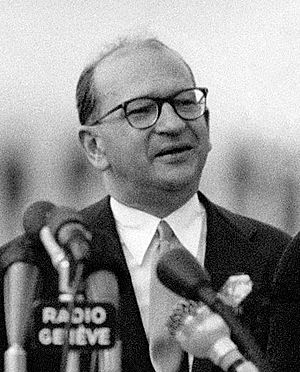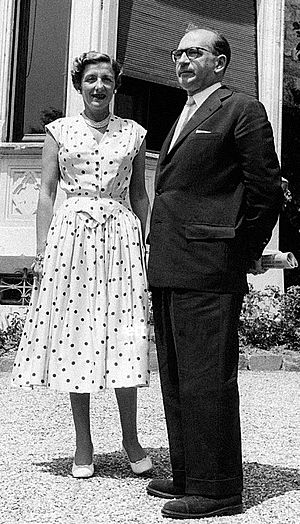Edgar Faure facts for kids
Quick facts for kids
Edgar Faure
|
|
|---|---|

Faure at the 1955 Geneva Summit
|
|
| Prime Minister of France | |
| In office 23 February 1955 – 1 February 1956 |
|
| President | René Coty |
| Preceded by | Pierre Mendès France |
| Succeeded by | Guy Mollet |
| In office 20 January 1952 – 8 March 1952 |
|
| President | Vincent Auriol |
| Preceded by | René Pleven |
| Succeeded by | Antoine Pinay |
| President of the National Assembly | |
| In office 2 April 1973 – 2 April 1978 |
|
| Preceded by | Achille Peretti |
| Succeeded by | Jacques Chaban-Delmas |
| Personal details | |
| Born |
Edgar Jean Faure
18 August 1908 Béziers, France |
| Died | 30 March 1988 (aged 79) 7th arrondissement of Paris, France |
| Resting place | Passy Cemetery, Paris |
| Political party | Radical Party (1929–1956; 1958–1965; 1977–1988) |
| Other political affiliations |
Union for the New Republic (1965–1967) Union of Democrats for the Republic (1967–1977) Rally for the Republic (1977) |
| Spouse | Lucie Meyer |
Edgar Jean Faure (born August 18, 1908 – died March 30, 1988) was an important French politician. He was also a lawyer, writer, and historian. Faure served as the Prime Minister of France twice, first in 1952 and then from 1955 to 1956.
Before becoming Prime Minister, he was part of the French government in Algiers during World War II. He was a member of the Radical Party for many years. In 1978, he was chosen to join the Académie Française, a very respected group of French writers and thinkers.
Contents
Life and Early Career
Edgar Faure was born in Béziers, France. His father was a doctor in the French Army. Even though he had poor eyesight, Edgar was a very smart student. He finished high school at just 15 years old. By age 19, he had earned a law degree in Paris. At 21, he became the youngest lawyer in France to join the bar association, which is a professional group for lawyers. While living in Paris, he became interested in politics and joined the Radical Party in 1929.
Joining the Resistance
During World War II, when Germany occupied France, Edgar Faure joined the French Resistance. This was a secret group of people fighting against the occupation. In 1942, he went to Algiers to join Charles de Gaulle's government-in-exile. There, he led the government's law department. After the war ended, he worked as a French lawyer during the Nuremberg Trials. These trials brought important Nazi leaders to justice for their crimes.
Political Rise
In 1946, Faure was elected to the French Parliament. His party, the Radicals, wasn't the biggest, but they were often key in forming governments. This is how he became Prime Minister in 1952 and again from 1955 to 1956. Faure was known as a more traditional leader within his party.
Changing Views and Later Roles
Over time, Faure's political ideas changed. He first opposed the new French government system, the Fifth Republic. However, he later became a supporter of Charles de Gaulle's ideas, known as Gaullism. In 1963, he went on a special trip to China for the French government.
He held many important government jobs. He was Minister of Agriculture from 1966 to 1968. From 1968 to 1969, he was Minister of National Education, where he helped make big changes to universities. He also served as Minister of Social Affairs.
Faure was known for adapting his views, earning him the nickname "weathercock." He famously joked, "it is not the weathercock which turns; it is the wind!"
He served in the National Assembly (like the House of Representatives) for many years. He represented the Jura area from 1946 to 1958 and the Doubs area from 1967 to 1980. He was even the President of the National Assembly from 1973 to 1978. He also served as a Senator (like a state senator) for Jura and Doubs.
On a local level, Edgar Faure was the Mayor of Port-Lesney for many years and also Mayor of Pontarlier. He led the General Council of the Jura department and the Regional Council of Franche-Comté. He also helped start and lead the Assembly of European Regions, a group that connects regions across Europe.
Edgar Faure passed away in 1988 and was buried in Passy Cemetery in Paris, next to his wife.
Personal life
In 1931, Edgar Faure married Lucie Meyer, who was a writer. Her father was a silk merchant. For their honeymoon, they traveled to the Soviet Union.
Key Political Roles
Edgar Faure held many important positions throughout his long career:
- He was the Prime Minister of France twice.
- He served as a Secretary of State for Finance and Minister of the Budget.
- He was the Minister of Justice.
- He held the role of Minister of Finance and Economic Affairs.
- He was Minister of Foreign Affairs for a short time.
- He served as Minister of Agriculture.
- He was the Minister of National Education, overseeing important reforms.
- He was also Minister of Social Affairs.
- He was the President of the National Assembly of France.
- He served as a Member of the National Assembly for different regions.
- He was a Senator for the Jura and Doubs regions.
- He was the President of the Regional Council of Franche-Comté.
- He served as Mayor of Port-Lesney and Pontarlier.
- He was the President of the General Council of Jura.
Images for kids
See also
 In Spanish: Edgar Faure para niños
In Spanish: Edgar Faure para niños
 | James Van Der Zee |
 | Alma Thomas |
 | Ellis Wilson |
 | Margaret Taylor-Burroughs |



